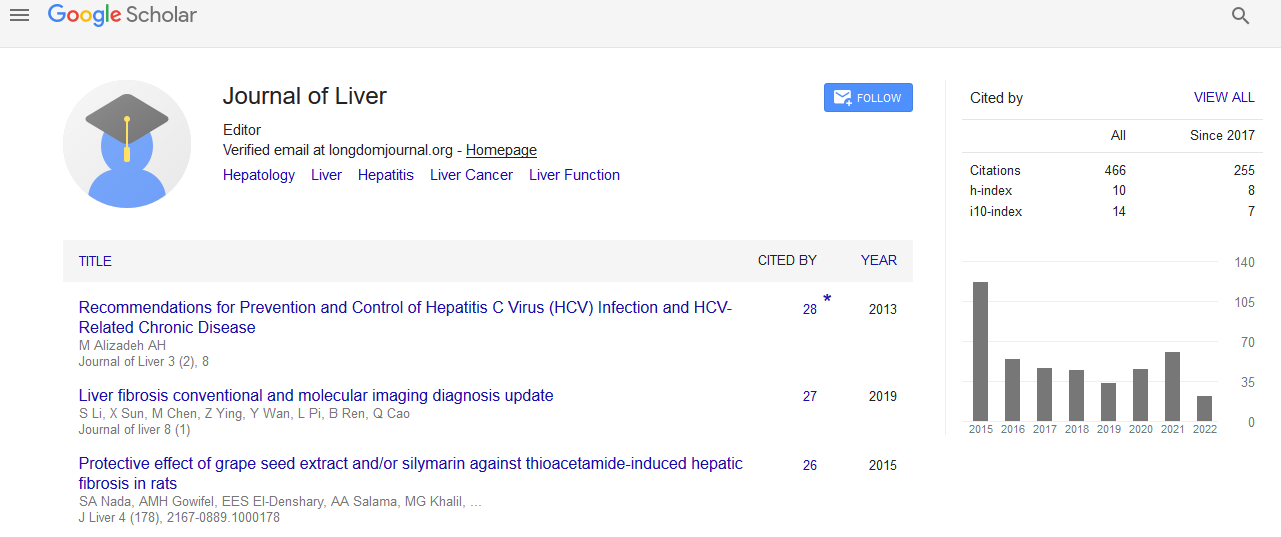PMC/PubMed Indexed Articles
Indexed In
- Open J Gate
- Genamics JournalSeek
- Academic Keys
- RefSeek
- Hamdard University
- EBSCO A-Z
- OCLC- WorldCat
- Publons
- Geneva Foundation for Medical Education and Research
- Google Scholar
Useful Links
Share This Page
Journal Flyer

Open Access Journals
- Agri and Aquaculture
- Biochemistry
- Bioinformatics & Systems Biology
- Business & Management
- Chemistry
- Clinical Sciences
- Engineering
- Food & Nutrition
- General Science
- Genetics & Molecular Biology
- Immunology & Microbiology
- Medical Sciences
- Neuroscience & Psychology
- Nursing & Health Care
- Pharmaceutical Sciences
HCC risk factors synergism in Egypt and how to prevent?
World Congress on Hepatitis
July 20-22, 2015 Orlando, Florida, USA
Ehab Abd-El-Atty
Scientific Tracks Abstracts: J Liver
Abstract:
Introduction: The burden of HCC has been increasing in Egypt with a doubling in the incidence in the past 10 years. There is a geographic correlation between the incidence of HCC and the prevalence of chronic hepatitis B and C, suggesting that these two viral infections are the most important risk factors of HCC. Several other risk factors for the development of HCC have been reported such as aging, gender, alcohol intake and NASH. Co-infection with HBV and HCV is associated with a higher risk for developing HCC than either infection alone. Materials & Methods: A retrospective study of the risk factors of HCC was done in 300 Egyptian patients with HCC and 50 patients with chronic liver diseases without HCC as controls. Results: The prevalence of HBsAg and HCVAb was significantly higher in HCC cases (18% & 70%) than controls (4% & 40%) (P=0.02 & 0.0001). On multivariate analysis, the risk of HCC development in smokers with HBV or HCV was 4.90 and 8.47 respectively (P=0.0001). It was higher than in non-smokers with HBV or HCV (OR=2.48 & 4.44) (P=0.037 & 0.0001). The risk of HCC development in HBV or HCV positive patients with DM was 3.98 and 9.19 respectively (P=0.001 & 0.0001). It was higher than for HBV or HCV positive patients without DM (OR=2.80 & 4.65) (P=0.031 & 0.0001). Conclusion: HCV and HBV infections, diabetes and smoking are the main determinants of HCC development in Egypt. Proper prophylaxis, active surveillance and secondary prevention programs for patients with chronic hepatitis are the most important steps to reduce the risk of HCC. Public awareness and health education of controllable risk factors such as smoking and DM will also reduce cases of HCC.
Biography :
Ehab Abd-El-Atty has completed his PhD from Faculty of Medicine, Menoufia University, Egypt and Master degree of Medical Sciences from Faculty of Medicine, Catholic University, Leuven, Belgium. He is Professor of Internal Medicine, Hepatology and Gastroenterology, Faculty of Medicine, Menoufia University, Egypt. He has published more than 30 papers in reputed journals and has been serving as a reviewer of Menoufia Medical Journal (MMJ). He is a member of AASLD (American Association for the Study of the Liver Diseases), ESGE (European Society of Gastrointestinal Endoscopy) and EASL (European Association for the Study of the Liver).

